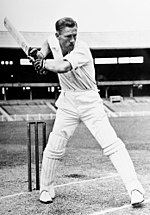Sam Loxton, Date of Birth, Place of Birth, Date of Death
TweetSam Loxton
Australian cricketer and politicianAbout Sam Loxton
- Samuel John Everett Loxton, OBE (29 March 1921 – 3 December 2011) was an Australian cricketer, footballer and politician.
- Among these three pursuits, his greatest achievements were attained on the cricket field; he played in 12 Tests for Australia from 1948 to 1951.
- A right-handed all-rounder, Loxton was part of Don Bradman's Invincibles, who went through the 1948 tour of England undefeated, an unprecedented achievement that has never been matched.
- As well as being a hard-hitting middle-order batsman, Loxton was a right-arm fast-medium swing bowler who liked to aim at the upper bodies of the opposition, and an outfielder with an accurate and powerful throw.
- After being dropped from the national team, Loxton represented Victoria for seven more seasons before retiring from first-class cricket.
- He served as an administrator after his playing days were over and spent 24 years as a Liberal Party member of the Victorian Legislative Assembly.
- Up until 1946, Loxton also played in the Victorian Football League (VFL) for St Kilda as a forward.
- In all three arenas, he was known for his energetic approach. Educated at Wesley College, Melbourne, Loxton first gained prominence as an Australian rules football player.
- After debuting in 1942, he played 41 games in the VFL for St Kilda as a forward, kicking a total of 114 goals before retiring at the end of the 1946 season to concentrate on his cricket career.
- In 1944, he headed St Kilda's goal-kicking aggregate with 52 goals and placed second in the club's Best and Fairest.
- Loxton served in a tank division during World War II and made his first-class cricket debut in 1946–47.
- He scored 232 not out, which remains a record for any Australian player on his first-class debut.
- After a strong first season, Loxton was selected to make his Test debut in the final match of the 1947–48 home series against India.
- Australia had already won the series and used the last match to trial their young talent.
- Loxton seized his opportunity, scoring 80 and taking three wickets, securing himself a position on the 1948 England tour. After a slow start to the historic campaign, Loxton struck form midway through the English summer and forced his way into the team for the last three Tests.
- He played a prominent role in the Fourth Test, scoring an aggressive and counterattacking 93 that helped Australia pry the initiative from England; the tourists eventually won the match.
- In 1949–50, Loxton cemented his position in the national team, playing in all five Tests in South Africa and scoring his only century at international level.
- He remained a regular member of the Test team until a form slump during the 1950–51 home season; he was dropped after three Tests against England and never played for Australia again.
- Loxton continued to play for Victoria in domestic competition until retiring at the end of the 1957–58 season. A member of the Liberal Party, Loxton entered politics and was a member of the Victorian Legislative Assembly, representing the electoral district of Prahran from 1955 to 1979.
- During this time, Loxton was also active in cricket administration at club, state and international level.
- He was a state selector for over two decades, and served at national level for ten years, starting in 1970–71.
- He was also the team manager for Australia's tour of the subcontinent in 1959–60, overseeing a successful campaign despite a spate of serious illnesses to personnel.
- Loxton had to deal with a variety of tumultuous events on and off the field during his tenure, often relating to player misconduct, and retired from cricket administration in 1981 following the underarm incident.
Read more at Wikipedia
See Also
- Famous People's Birthdays on 29 March, Australia
- Famous People's Birthdays in March, Australia
- Famous politician's Birthdays on 29 March, Australia
- Famous politician's Birthdays in March, Australia
- Famous cricketer's Birthdays on 29 March, Australia
- Famous cricketer's Birthdays in March, Australia
- Famous Australian rules footballer's Birthdays on 29 March, Australia
- Famous Australian rules footballer's Birthdays in March, Australia


 Date of Birth:
Date of Birth:  Place of Birth: Albert Park, Victoria, Australia
Place of Birth: Albert Park, Victoria, Australia